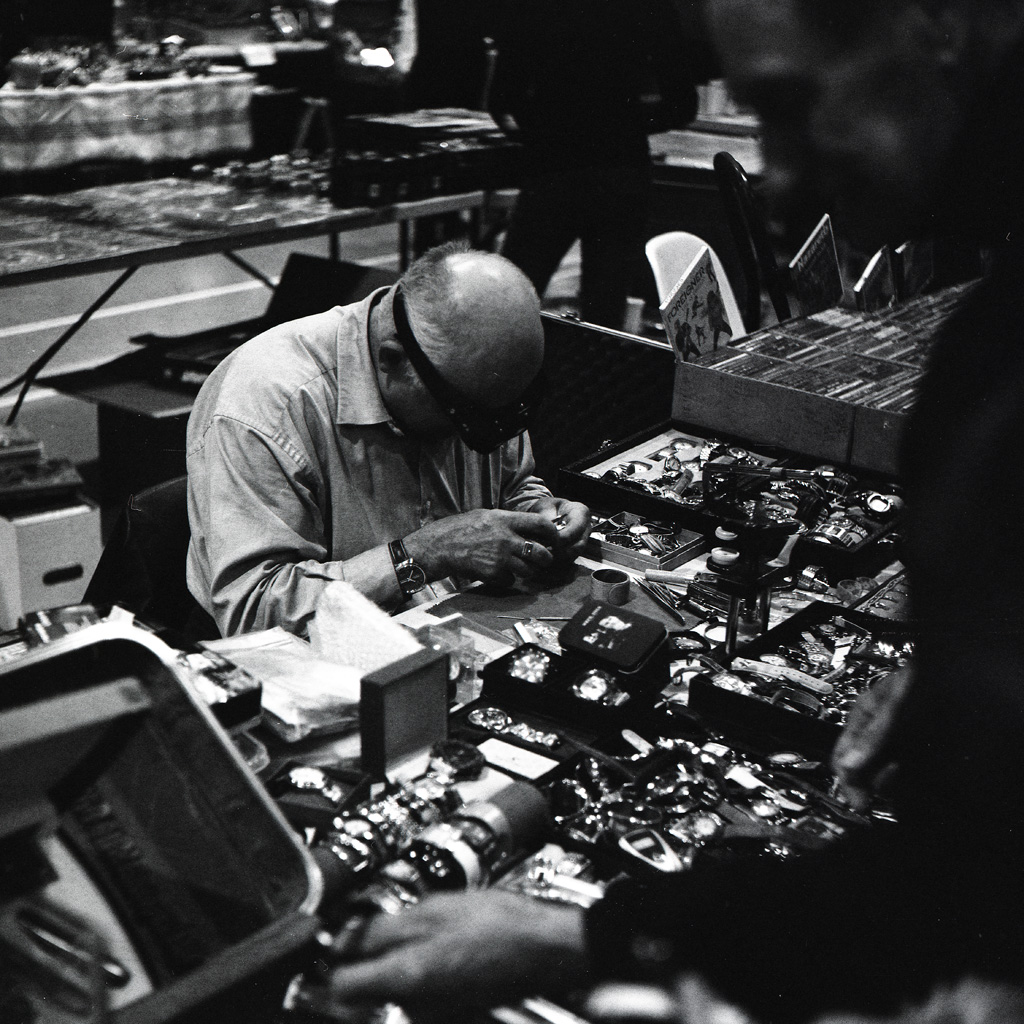My A/V Media Diet
What do you watch and listen to on a regular basis? We are what we eat, and that goes for the information we consume. Today's post (part 2 of a 3 part series) is about the sources that make up my Audio/Visual media diet.
Audio Subscriptions
I have been a devoted listener and subscriber to?The Mars Hill Audio Journal?since 2003. Ken Myers, from Charlottesville, VA, has created an audio journal that is exactly opposite everything our popular culture embraces: his interviews are long, unconcerned with the latest and loudest, and deeply concerned with the deep questions that humans have been asking for millennia.The name of the?Journal comes from Acts 17, where the Apostle Paul goes to Mars Hill in Athens and interacts with the pagan philosophers on their own terms.
Podcasts
- The Eric?Metaxas Show,?which features Eric Metaxas and his wide variety of guests;
- Andy Stanley Leadership Podcast;
- Munger?Place Audio Podcast: though it's painful for me to listen to my own sermons, I still do so from time to time because I know that hearing myself helps me become a better preacher;
- Fresh Air:?Half the time I'm either completely uninterested in Terry Gross's interviews or else in complete disagreement with her perspective, and the other half of the time I'm captivated by the long-form interviews featured on Fresh Air;
- In Our Time, a long-running radio show on the BBC hosted by Melvyn Bragg, who interviews British academics to talk in detail about history, science, etc.
- This Is Your Life with Michael Hyatt. I liked the earlier version of this podcast better than the current episodes, but from time to time I still benefit from Michael Hyatt's insights on productivity and leadership.
Television
I don't watch much television these days and we don't have cable. When I do watch TV, it's mainly with my family and mainly on Sundays: NFL football, 60 Minutes, and America's Funniest Videos. As a family, we also watched American Ninja Warrior on Mondays this summer.I've watched every episode of?Arrested?Development multiple times (via Netflix and Hulu), and, until Netflix took it off the air, would also rewatch?Fawlty Towers. (This watching of the same shows over and over again drives my wife crazy.)
Social Media
I reluctantly use Facebook for my job because it helps me stay connected with people in my congregation, and it helps me remember names. On the other hand, I've been an enthusiastic user of Twitter: I like the ways it allows me to follow lots of really interesting people.However, as I wrote about a few weeks ago, in early summer 2015 I deleted both the Facebook and Twitter apps from my iPhone and I haven't looked back. I still use Facebook from time to time, but I've essentially not read anything on Twitter for over 3 months.
Audiobooks
I love audiobooks, and in the last year have been using the Overdrive app from the Dallas Public Library, which allows you to check out audiobooks from your local public library. (I have to be honest, though, and tell you that I miss books on tape. Those were the days.)
Coming in Part 3
The final installment in this series will run next Monday and will be about I subscribe to and read in print: books, magazines, journals, etc. (Click here to read part 1, about my online media diet.) The above was what I listen to and watch on a regular basis.What about you? What sources make up your A/V media diet?
P.S. Subscribe!
If you've read this far, why not subscribe for updates from my blog? I supposedly post 3 times a week on Mondays, Wednesdays, and Fridays (I say supposedly because it's been much less frequently recently). Click here to subscribe.
My Daily Media Diet
What are the books, podcasts, websites, blogs, and newsletters that make up your media diet? You are what you eat, and that includes the information you consume. Today's post is about what I read daily as part of my media diet (part 1 of a 3 part series).
What Is a "Media Diet?"
"Media diet" is a phrase I came across several years ago in a web series by?The Atlantic. A reporter would interview public figures about how they stayed informed and what they regularly read and watched and make a simple post out of it. (I still remember Malcolm Gladwell's comment about his daily reading habits:?"Since my brain really only works in the morning, I try to keep that time free for writing and thinking and don't read any media at all until lunchtime." I totally identify....)In part 1 of this series (parts 2 and 3 coming on the next two Mondays) about my media diet, I'll focus on what I read daily (or at least regularly).
What I Do First Thing in the Morning
I've written before about the importance of the First 15, i,e., spending?at least the first 15 minutes of your day in prayer, scripture, and silence. So, I've been getting up really early recently in order to have an unhurried time of prayer first thing, before I workout.Currently this is what I use in my prayer time:
- the NRSV Thinline Bible I was given by the bishop at my ordination;
- the scripture reading calendar my church gives out through our?Eat This Book program;
- Seedbed's Field Guide to Daily?Prayer (I really like the 30 day- reading plan for the Psalms);
- and a small journal that I write in about once a week or so.
Breakfast:?The Dallas Morning News and NPR
After working out and while eating breakfast and getting ready:
- I get the print version of?The Dallas?Morning News delivered at home, and read it every morning (except Sundays, when I don't get to it until late afternoon, if at all). I have come to really like?The DMN and get more locally-focused and sports news from it than anywhere else.
- I listen to NPR's?Morning Edition radio program most mornings.
Blogs: Rod Dreher (and Not Much Else)
I used to read Andrew Sullivan's blog almost every day. Now that he has stopped blogging, almost the only blogger I read regularly is Rod Dreher. Rod Dreher is a fascinating and unique writer: a convert to Eastern Orthodoxy living in his native rural South Louisiana who writes about culture from a social conservative point of view.One of the topics Rod Dreher writes about that I find most intriguing and persuasive is the so-called "Benedict Option": the idea that Christians in the West today may need to follow the 5th century example of St. Benedict and spend less time participating in politics and the culture wars and more time deliberately cultivating the practices that will "thicken" our faith and deepen our witness. Here is a post from Rod's blog in July that summarizes his thoughts on the Benedict Option.
Websites I Read Almost Daily
- I read?The New Yorker almost every day. I like the short form pieces from folks like John Cassidy and Amy Davidson, but I really prefer The New Yorker for its?long-form essays like this one about Northern Ireland that I wrote about in April.
- I also browse?The Atlantic's website regularly, though I believe that?The Atlantic?is a much worse magazine since it expanded its online footprint. Many of the online articles seem to be merely a slightly (sometimes?very slightly) more serious version of the kind of thing that I suppose you find on Buzzfeed or The Huffington Post, and I do not mean that as a compliment. The Atlantic these days seems to feature quick-reaction pieces on hot-button topics that lack nuance and wisdom. (I'll say more about my complaints with?The Atlantic in part 3 of this series.)
- I browse the?Yahoo! main site and scroll through the headlines, particularly about sports and politics.
- I check out the?BBC Sport's soccer page almost daily.
Online Newsletters and Other Sites
- I read movie reviews on?Plugged In every few weeks or so. I'm interested in movies, but I like reading reviews from a conservative Christian perspective (a perspective you don't get from mainstream reviewers). I rarely have time to see movies in the theater anymore, so I find myself reading many more reviews of movies than actually seeing movies.
- I've recently discovered?Book Notes,?a free newsletter from Byron Borger, owner of Hearts and Minds bookstore in central Pennsylvania. Through Book Notes, I've stumbled across books that I would never have heard of elsewhere--it's a great resources.
- I read articles and watch videos the videos on the CrossFit main site several times a week.
Coming in Parts 2 and 3....
Parts 2 and 3 will be about what I regularly listen to and watch and read in print. The above is what I read online on a regular basis. What about you? What makes up your daily media diet?
P.S. Subscribe!
If you've read this far, why don't you go ahead and subscribe to my blog? I post 3 times a week (Mondays, Wednesdays, Fridays). Click here to subscribe.
5 Reasons to Love the State Fair of Texas
The 2015 State Fair of Texas opens today and I am fired up! I look forward to seeing Big Tex each fall and each year he doesn't disappoint. Here are 5 reasons to love the State Fair of Texas.
Everybody's There and Everybody's Happy
The State Fair is one of the few places in Dallas where everybody comes together: rich folks, poor folks, city slickers, small town farmers; black folks, white folks, hispanic folks; folks from Highland Park and folks from Fair Park: everybody is at the State Fair. And, everybody is happy to be there.If there is a better place to people watch, I haven't found it.
The Food is all Fried
 Fletcher's corny dogs, fried Thanksgiving dinner, even fried beer.At the State Fair, all the food groups are covered...in batter.
Fletcher's corny dogs, fried Thanksgiving dinner, even fried beer.At the State Fair, all the food groups are covered...in batter.
The Car Show is Texas-Sized
 I love browsing the 2 huge car pavilions. It's fun to sit in the drivers seats and pop the trunks of dozens of cars that I would never ever consider buying. (Although, be warned: I've actually bought?two cars over the years after first sitting in them at the Fair's Auto Show.)
I love browsing the 2 huge car pavilions. It's fun to sit in the drivers seats and pop the trunks of dozens of cars that I would never ever consider buying. (Although, be warned: I've actually bought?two cars over the years after first sitting in them at the Fair's Auto Show.)
The Demonstrations are Mesmerizing
 In several of the exhibit halls, informercial pros demonstrate knives and blenders and shower heads and mops and vacuums and ladders. These guys are good. I mean, can your blender make a soup?
In several of the exhibit halls, informercial pros demonstrate knives and blenders and shower heads and mops and vacuums and ladders. These guys are good. I mean, can your blender make a soup?
The Farm Children are Inspiring
 It does my heart good to see the little boys from Texas farms tend their donkeys and cows and pigs and goats and sheep. Little boys with blue jeans and flannel shirts and cowboy hats who look exactly like their tall fathers beside them. I'm glad that world still exists and seeing those farm families makes me proud to be an American. Really.
It does my heart good to see the little boys from Texas farms tend their donkeys and cows and pigs and goats and sheep. Little boys with blue jeans and flannel shirts and cowboy hats who look exactly like their tall fathers beside them. I'm glad that world still exists and seeing those farm families makes me proud to be an American. Really.
What About You?
If you've been thinking about visiting Dallas, you should plan a visit during the Texas State Fair, which runs for 3 weeks every September and October. The weather will be gorgeous and the whole experience is can't miss.If you do visit, Big Tex and I will be waiting for you.
Jesus is Not Running For President
Hypocrisy. "Hypocrisy" is the first complaint many people make against Christians. And you know what? They're right: we?are?hypocrites. Especially when it comes to politics.
Politics First, Faith Second
I‘ve noticed that many American Christians are shaped more profoundly by the political views of our respective tribes?liberal, conservative, etc.‘than we are by the Jesus we claim to follow. Recent polling of American Catholic views of Pope Francis are a good example of this tendency:
- Conservative Roman Catholics are in approval of the Pope‘s views on same-sex marriage and abortion (he‘s opposed to both) but they disapprove of his remarks on climate change and his critique of unfettered capitalism.
- Liberal Roman Catholics are the exact opposite.
I am not in any way implying that the Pope speaks for Jesus, nor that all Christians ought to think the same way as Pope Francis. My point is simply that it is troubling that American Catholic views of Pope Francis break down along partisan lines.And it‘s not only Roman Catholics who do this: Protestants like me do the same thing as well. And this tendency to put politics first and faith second is extremely problematic.
Jesus is Lord, Not Caesar
?Jesus is Lord, and not Caesar. For 2,000 years, Christians have made the claim that the ultimate authority is not whoever holds temporal political power, but that Jesus Christ is rightful Lord of the universe. Jesus is Lord, which means his place is first, and I (and everything else) am second. But when people who claim to follow Jesus take their identities from the Democratic or Republican parties first and from Jesus second, we are effectively saying, Caesar is more important than Jesus. We are saying our first allegiance is to our political tribe and we are only paying lip service to our Lord. Our tendency is to justify our political views with our faith, rather than beginning with our faith and then trying to work out our politics. In other words, we are hypocrites.
No, It's Not Wrong to Vote Red or Blue
I am not saying that if we all just followed the Bible then we would know exactly how to vote. I'm not that na‘ve. The Bible is not always easy to interpret or understand, and even if it were, this world is complicated and imperfect, so policy decisions are always going to require choices between lesser and greater evils and actions without certainty of outcomes. Life is complicated, and because of this, some Christians will believe that they can be more faithful Christians in the public square as Republicans and some will believe they can be more faithful followers of Jesus as Democrats, etc. It‘s not wrong to take a political position on this or that issue.What is wrong is to be a Republican or a Democrat first, and a follower of Jesus second. If you believe everything in your respective party‘s platform is 100% in line with the teachings of Jesus, you have a problem. It should be obvious that Democratic or Republican policies are uncertain attempts to work in a messy world‘they are not gospel, and we should not confuse them as such.
A Quick Self-Assessment
How do you know what you believe? If you are a Christian, do you believe what you believe because you have deeply wrestled in prayer and searched the scriptures over this or that issue, or do you believe what you believe because everyone in your political tribe thinks this way?So, with regard to the topics below, we need to ask ourselves, Why do we believe what we believe??
- Same-sex marriage
- Guns
- War
- Torture
- Drone attacks
- Immigration
- The Planned Parenthood videos
- The Death Penalty
- Welfare policies
Jesus is Not Running For President
We are going to have to pick a president next year, and that president will not be perfect. Christians will disagree over which man or woman running is best equipped to lead our country. That is okay. What is not okay is for me to transfer my ultimate allegiance to my political tribe. Jesus is not running for president, and political parties and partisan positions shouldn‘t be worshipped. Don‘t make the mistake of putting second things in the place of what ought to be First. That‘s called idolatry, and it never works out very well.Just ask the builders of Babel.
Click?here‘to subscribe to my blog updates, delivered right to your inbox.
3 Reasons to Delete Facebook
It had been coming for a while, but this summer I finally decided I needed to delete social media from my iPhone to maintain my sanity. Here's why I deleted Facebook and Twitter, and here are 3 reasons why you should, too.
Why I Deleted Social Media from my iPhone
Over the past several years, I'd found that being connected online increased the worry and stress in my life. It's now been 3 months since I made my smart phone dumber by deleting the Facebook and Twitter apps, and here are 3 reasons I'm glad I did.
Reason?#1: I?Have Less Anger and Anxiety
Facebook and Twitter are overrun?with keyboard cops and their self-righteous indignation, and the sad thing is that the self-righteous indignation of other people produced self-righteous indignation in me, directed at them. Anger and self-righteousness come naturally to me: I don't need social media's help to feel superior to the people who feel superior. Without a constant stream of social media outrage at my fingertips, I have less anger and more peace.Facebook in particular also produces comparison in its users: you are constantly thinking, "I wish I had that or looked like that." Facebook too often caused me to break the 10th commandment (that's the one about coveting, for all you biblical illiterates), and without Facebook on my phone I have less of the anxiety that materialism and jealousy and lust produce in my heart.I'm not withdrawn from the world, nor am I naive: I read the paper and catch the news every day. But, there is something about the way social media delivers information that caused me to feel a constant low level of anxiety. Since deleting Facebook and Twitter from my phone, I experience much less anxiety and worry.
Reason?#2: I Have More Focus
When Facebook and Twitter were a fingertip away, I found myself constantly checking and looking at those apps. The irresistible allure of seeing what was happening made it very difficult for me to focus 0n the things that matter. Since deleting social media from my iPhone, I find that I'm less distracted and more focused.And when it comes to prayer there is no question: social media is the enemy. Distracted and unfocused prayer is no prayer at all.
Reason?#3: I?Have More Time
Everybody's busy, but few people are productive. I found that the constant scrolling and checking and commenting and retweeting that social media encourages meant that I was becoming more and more unproductive. Since deleting Facebook and Twitter from my phone, I've found that I have more time to get things done. (For example, I've read more books since deleting social media, and reading is an activity that gives me peace and helps me become a better leader and preacher.)
What Now?
I still have Facebook and Twitter accounts, but to access them I have to use my laptop, which means, because it takes more effort to login, I'm much less likely to mindlessly scroll through them. Will I keep my phone social-media-free forever? I don't know. But, I can honestly say making my smart phone dumber has probably made me smarter.What about you? Are you willing to try it?
We're Hiring a Youth Minister
Want to come work with me and my team at our great church? Know someone who does? We are looking for a youth minister to lead our ministries to middle and high school students. Our church has been blessed with a lot of growth in the past year (our worship attendance is up 36%) and we're reorganizing our staff, which means we have a great opportunity for the right person to lead our youth ministry. Is that you? The job details are posted below. (Please note that job applications do not come to me; in fact, I'm not involved in the hiring process until the final interviews.)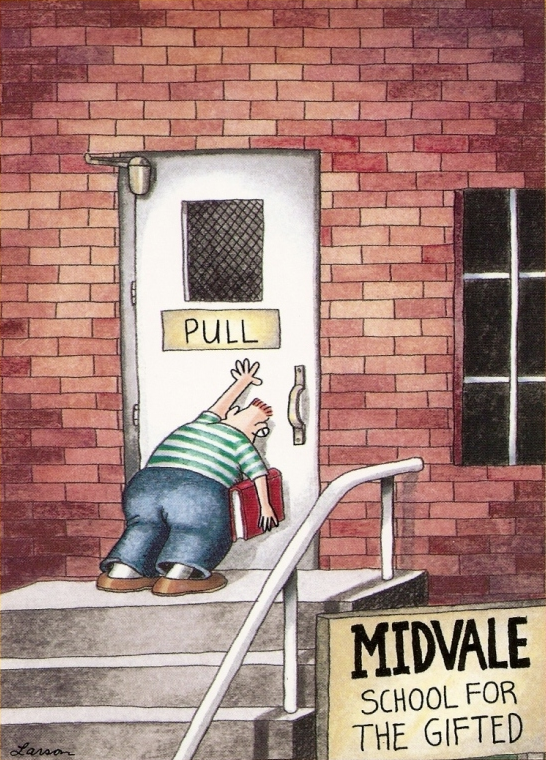
Director of Youth Ministry - Munger
Responsible for all aspects of Munger Place Church's ministry to youth in grades 6-12, to?help families raise their middle school and high school students to love and follow Jesus Christ. This person will work within Munger Discipleship ministry and with a team of volunteers to plan, coordinate and execute the ministry.Location:??HPUMC's Munger Place Church in Old East DallasResponsibilities?include the following, with additional duties as required or assigned:
- Pastoral:? Minister to youth and their families through Sunday school and other church programs, being present in their lives outside the church walls, available for common concerns and in crisis situations, and through pastoral care visits.
- Leadership:? Recruit, training and nurture Youth Ministry and Confirmation volunteer teams; lead adult volunteer leadership meetings, trainings and retreats; participate in the research, design, and implementation of a ministry to parents of youth.
- Administration:? Manage the planning process and coordinate all regular ministries to youth and their families, which includes youth Sunday mornings, Confirmation, special events, trips and retreats, parent meetings, etc.; update Munger Youth and Confirmation web pages.
- Stewardship:? Ongoing evaluation of the effectiveness of youth programs/events and reacting accordingly; manage youth ministry budget; collaborate with Confirmation and youth ministries at HPUMC.
The Director of Youth Ministry - Munger is expected to maintain high Christian values and professional integrity in order to provide an example for the youth and families of our community. This position will also encourage all youth and families of the community to strive for the same standards.HPUMC/Munger Place is a high-performing, fun and supportive environment where your work is appreciated!? We provide competitive pay, full benefit package and generous holiday schedule.WE REQUIRE?a Christian (preferably United Methodist) committed to living a life that reflects the Gospel who is comfortable working in a United Methodist church and has the following qualifications:
- Bachelor's degree; seminary or other formal religious education a plus
- At least 3 years experience in church ministry as staff or lay leader
- Ability to build, lead and empower volunteer teams
- Ability to implement a ministry vision
- Familiarity with United Methodist doctrine required; must be comfortable teaching it and representing the church
- Proficient computer skills?using applications such as MS Word, Excel, PowerPoint, database, email, Internet and social media
- Supervisory experience preferred
- Ability to evaluate and adapt curriculum preferred
- Must have excellent organization, communication (verbal and written) and listening skills, with a high degree of initiative and accountability
- Exceptional interpersonal and relational skills required, with sensitivity to church members and visitors
- Understanding and enjoyment of youth and families and guiding their spiritual development
- Familiarity and comfort with diverse socioeconomic populations
- Good driving record; ability to drive church van with passengers
- Physical demands include sitting, standing, walking, seeing, hearing, lifting approx. 10 lbs.
To Apply,?please email all of the following to?jobs@hpumc.org, specifying Munger Youth in subject line:
- Your resume and cover letter/email
- Your pay requirement
- Your religious/church affiliation & statement of faith
- Your philosophy of youth ministry
No calls, please.- See more here.
The Real Root of Our Dissatisfaction
"It's no wonder we often find ourselves looking for satisfaction in all the wrong ways. You and I are deluged from every side by advertising designed to foster dissatisfaction with our current lives. From what I've seen on television, my life would be much more satisfying if I were to eat Special K for breakfast, buy my car insurance form GEICO, and wear a Breitling watch. No one is impervious to advertising's influence....
The real root of our dissatisfaction goes deeper than our response to the blitz of media advertising. It resides somewhere deep in our souls and traces its origins all the way back to Eden. The serpent's question to Eve strikes home in all of our hearts: 'Did God really say, "You must not eat from any tree in the garden"?'Before this, Eve had delighted in God's provision, but now she wants more. She decides that the only fruit that will satisfy her hangs from the branches of the one tree God forbade her to eat from. But upon partaking of the fruit, she finds--as we all have--that living outside of God's boundaries and provision leads to fatal dissatisfaction. Once humanity crossed the threshold into a broken relationship with God, we've been dissatisfied ever since."from?Simplify: Ten Practices to Unclutter Your Soul, by Bill Hybels (pp. 256-257)
Why Did God Permit the Charleston Murders?
We don't know. "We don't know" is the honest answer to any question about why God permitted Dylan Roof to murder the Charleston Nine. No one knows. But though we will never have a definitive answer this side of the grave, a strange parable Jesus tells does offer an interesting perspective on the perennial "Why?" we ask whenever innocent people suffer.
Today's Eat This Book Portion
The?Eat This Book campaign?at my church provides folks a scripture reading schedule to follow. Right now, we are reading through the Gospel of Matthew (about a half chapter a day), and today's reading comes from Matthew 13, one of my favorite passages in scripture. Reading the strange parable of the wheat and the weeds this morning has got me thinking about last week's murders in Charleston.
The Wheat and the Weeds
 Surrounded by a crowd by the shore of the?Sea of Galilee one day, Jesus told the following parable:
Surrounded by a crowd by the shore of the?Sea of Galilee one day, Jesus told the following parable:
??The kingdom of heaven may be compared to someone who sowed good seed in his field;?but while everybody was asleep, an enemy came and sowed weeds among the wheat, and then went away.So when the plants came up and bore grain, then the weeds appeared as well.And the slaves of the householder came and said to him, Master, did you not sow good seed in your field? Where, then, did these weeds come from???He answered, An enemy has done this. The slaves said to him, Then do you want us to go and gather them???But he replied, No; for in gathering the weeds you would uproot the wheat along with them.Let both of them grow together until the harvest; and at harvest time I will tell the reapers, Collect the weeds first and bind them in bundles to be burned, but gather the wheat into my barn....??Then he left the crowds and went into the house. And his disciples approached him, saying, Explain to us the parable of the weeds of the field.?He answered, The one who sows the good seed is the Son of Man;the field is the world, and the good seed are the children of the kingdom; the weeds are the children of the evil one,?and the enemy who sowed them is the devil; the harvest is the end of the age, and the reapers are angels.Just as the weeds are collected and burned up with fire, so will it be at the end of the age.The Son of Man will send his angels, and they will collect out of his kingdom all causes of sin and all evildoers,?and they will throw them into the furnace of fire, where there will be weeping and gnashing of teeth.Then the righteous will shine like the sun in the kingdom of their Father. Let anyone with ears?listen!'"(Matthew 13:24-30, 36-43)
Parables are meant to unsettle, to make you think. So go read this strange parable again, slowly. (In other words, don't scan the way you normally do on the Internet.)
Some Quick Observations
- Jesus points out that evil and good are so tightly mixed together in this world that no man or woman can perfectly separate one from another. I know this is true, because I know it is true in me.
- Jesus reminds us that, though evil seems to be growing stronger, so is good. This is an evil world, but evil is not stronger than good.
- Jesus says that, this side of Judgement Day, it is impossible to root up all the evil in the world without also destroying the good. For reasons only known to God, if there is to be good in the universe, there must also be the freedom for evil.
- Jesus makes it very clear that evil, though it seems strong today, will one day be utterly destroyed by God.
Let Me Know What You Think
I?find this parable strangely comforting. What about you? What do you think this parable is about, and how might it relate to the evil that was done in Charleston last week?
What If Creationists and Atheists Are Both Wrong?
What if the way you've been thinking about God is all wrong? If so, you're in good company: according to Ric Machuga, both creationists and atheists also tend to think about God incorrectly, and both groups have been thinking about God incorrectly in the same way.Dr.Machuga is professor of philosophy at Butte College in Northern California, and the author of?Three Theological Mistakes: How to Correct Enlightenment Assumptions about God, Miracles, and Free Will. In a recent article in?Books and Culture, he argues that both creationists and atheists often make the same mistake when thinking about God. (The article is behind a paywall; I subscribe to the print journal.)
Is God Like a Divine Watchmaker?
Does God exist? Creationists say yes, and atheists say no. However, we need to more specifically define what we mean by "exist:"
[Medieval philosphers] Moses Maimonides (Jewish), Thomas Aquinas (Christian), and Ibn Rushd (Muslim) all understood that 'existence' was not a simple Yes/No matter. While God certainly 'exists,' they all insisted that God's 'existence' was fundamentally unlike everything else's 'existence.'"
Creationists, Atheists, and Even Isaac Newtown....
In our scientific culture, we tend to think of God as a divine craftsman, a heavenly watchmaker who made the universe and set it ticking. Creationists fight hard to defend the idea of God as divine craftsman (using Genesis 1-2), while atheists fight hard to discredit the idea of God as divine craftsman (using biology, cosmology, and paleontology). But what if God isn't like a watchmaker at all?[embed]https://flic.kr/p/5hMX2w[/embed]Professor Machuga points out that thinking about God as the ultimate craftsman is a logical mistake.
Watchmakers and watches both exist. And though they are very different in many ways--watchmakers are conscious, intentional agents; watches are not--their 'thingness' is precisely the same. Contrast this with the difference between Shakespeare and Hamlet. While both the author and his character 'exist,' they certainly don't exist in the same way. Shakespeare existed as a human being. Hamlet only 'exists' as the fictional character created by Shakespeare. Yet, the difference between Shakespeare's existence and Hamlet's existence is far less than the difference between God's existence and everything else"?[emphasis mine].
Isaac Newton thought that the physical laws he uncovered were "not only consistent with the existence of a supernatural Craftsman, but that they required such a God." Unfortunately, Newton, for all his brilliance, made a mistake in thinking about God:
Of course, in one sense, Newton knew that God and his creation 'existed' in different ways. Breadth, height, and weight are common to all material objects, whereas God is a pure spirit with neither breadth, height, nor weight. Nevertheless, to speak of a 'very skilled mechanic' [Newton's phrase] intervening to prevent planetary chaos?presupposes that God and the planets exist in the same way and in the same universe" [italics in the original].
But, God and the universe do NOT exist in the same way. God is not a just divine craftsman, and thinking of God in that way points us in the wrong direction. A better direction is to think of God as a divine playwright, because God's reality is utterly distinct from the reality of the universe he created. If this distinction seems confusing, just think about Shakespeare:
Because Shakespeare is not contiguous with the world of his creature, he can have a reality, endurance, stability, and 'otherness' that far exceeds Hamlet's. Without Shakespeare, Hamlet is literally nothing. But without Hamlet, Shakespeare is still something, even if his glory is slightly diminished."
God Isn't a Divine Watchmaker, but a Divine Playwright
God is not simply the largest, greatest, and strongest part of our reality; God is another reality, distinct from us. God is not a divine watchmaker who sets the universe ticking; God is a divine playwright who wills us into existence from his imagination.
We Can't Prove or Find God, Unless....
This means that the only evidence for God that can be found in our universe is evidence that God deliberately places here. It means that we shouldn't expect to be able to prove God's existence any more than Hamlet could prove the existence of Shakespeare. It means that unless God shows up, we can never ever find him.And it means that the Incarnation changes everything.
Exactly One Year Ago
Exactly one year ago the bishop put his hands on my head and said:?David Andrew Forrest, take authority as an elderto preach the Word of God,to administer the Holy Sacraments,and to order the life of the Churchin the name of the Father and of the Son, and of the Holy Spirit.I was ordained on June 2, 2014. (I wrote about my ordination day here.) What follows are some quick thoughts on what's changed in the past year.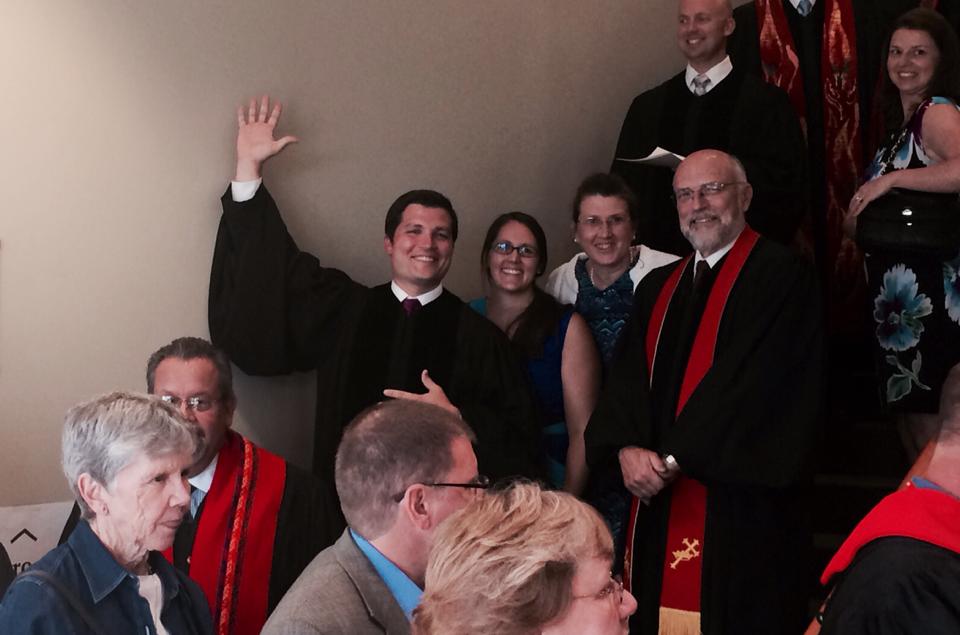
It's Like Getting Married....
I've heard Hollywood couples‘say "We don't need a piece of paper to prove our love for each other; we love each other now, even though we're not legally 'married.'" At first, that statement makes sense--if you are already living together, sleeping together, and sharing finances, what difference would getting married make?Anyone who has ever been married, however, can attest: something does?change after you say "I Do." It's hard to explain, but you are different when you walk out of that church than you were when you walked in.It's the same with ordination. I was already serving as a pastor at Munger, but when I walked out of the service that humid June evening one year ago, I was different. It's hard to explain, but it's true.
The One Thing I Never Question
I feel secure in my calling. There are lots of things I question, but I?never wonder if the Lord has called me to be a pastor: I?know that I'm doing what I was created to do.
And One Thing I Was Wondering This Past Sunday
This past Sunday at my church was Confirmation Sunday, when our 6th graders step up and claim the Faith as their own. It was my great privilege as their pastor to baptize and confirm 45?of them. During my confirmation sermon at our 11 AM service, I gave an aside in which I spoke to the students and told them that if any one of them was feeling called by God to do what I do--be a pastor, i.e., a shepherd of people--that they should do it. I mentioned what an absolute privilege it is to be with people cradle to grave, to share their greatest joys and sorrows, to preach the Word in season and out.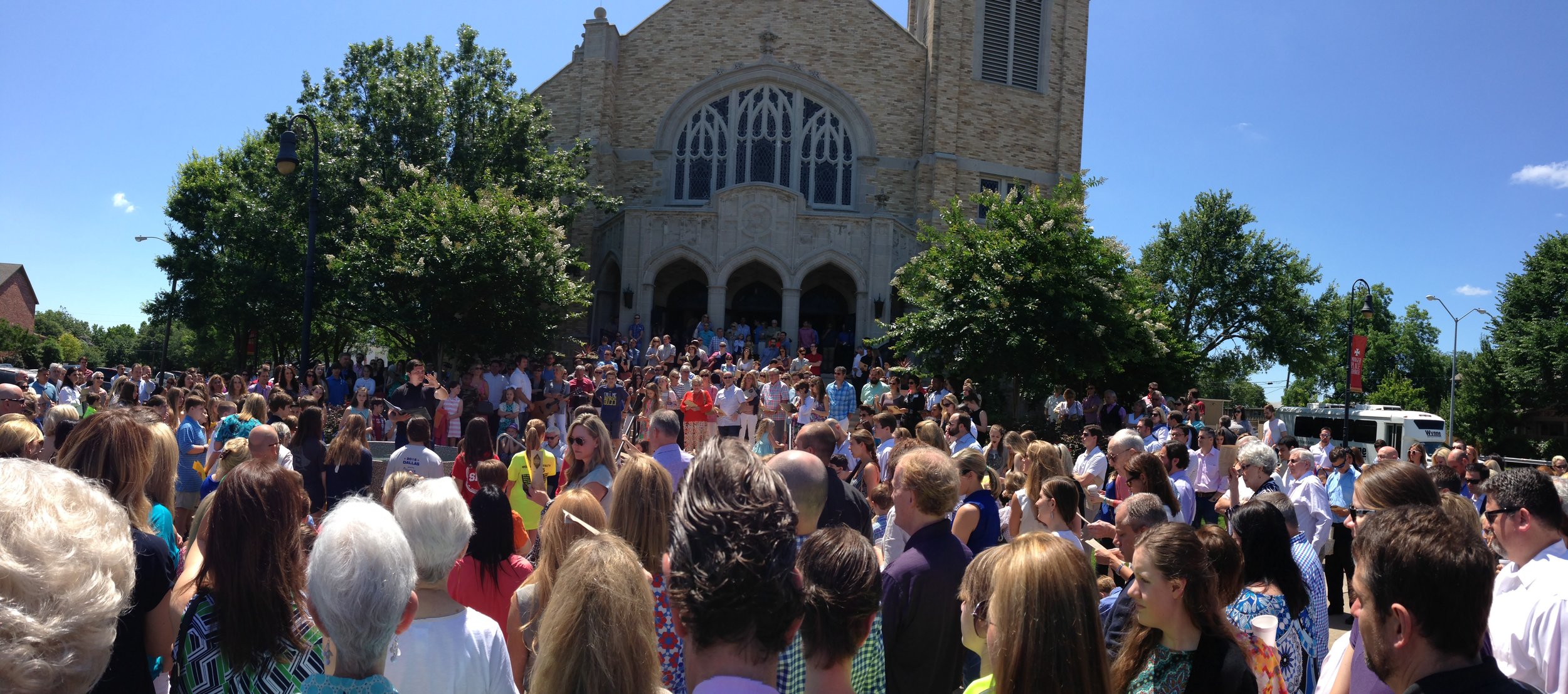 Later on, it was time for me to go along the line of kneeling 6th graders and place my hands on them and say:
Later on, it was time for me to go along the line of kneeling 6th graders and place my hands on them and say:
[Name], the Holy Spirit work within you, that being born through water and the Spirit you may be a faithful disciple of Jesus Christ."
As I moved down the line, the thought occurred to me that about 25 years ago (turns out it was 23 years ago--see below), a pastor put his hands on my head during my confirmation service at little Providence United Methodist Church in Dare, Virginia. I remember my confirmation as being a powerful moment--a "red letter day"--in my life. What if one of the 45‘students that I confirmed on Sunday were to find himself or herself in my place a quarter century from now? That would be too beautiful for words.May God make it so.
What if one of the 45‘students that I confirmed on Sunday were to find himself or herself in my place a quarter century from now? That would be too beautiful for words.May God make it so.
How My Friend Mike Found His Way Back
It's sad but true: "pain is God's megaphone to rouse a deaf world." What C.S. Lewis meant by that phrase is that it's often not until we are really hurting from self-inflicted wounds that we are ready to turn from running away from God to running to God, only to find that the God is there to welcome us home. My friend Mike's story of redemption and healing is one more example of this pattern. And it's a great story....On Highland Park United Methodist's website, Mike tells of his anguish after learning his marriage of 12 years was ending:
I was in the backyard with our three dogs (two of whom were about to move away) and I fell to my knees and starting howling like a wounded animal. Eventually, it resolved into something resembling words, 'Oh God, Oh God, Oh God?'"
God put great people in his life at exactly the time Mike needed them, and one of them invited Mike to both our church and his men's group. I remember well the first interaction I had with Mike, which he describes here:
I made arrangements to meet with Josh [Mike's friend and a member of my congregation] and he left me with one key takeaway: I should join him and Kimberly [Josh's wife] at Munger Place Church that Sunday. I wasn‘t particularly interested, but I was too weak to say no.I walked into Munger, my first steps into a church for the better part of 20 years. I was pleased to find that the music was incredible. I was further pleased and surprised to find that Rev. Andrew Forrest‘s sermon was both thoughtful and gracious towards those who weren‘t all-in. I agreed to come back for a second week.That second week, Rev. Forrest preached about a mishap in a river that led him to realize that swimming against the current is a fruitless and tiring exercise. It touched my heart and I felt better for the first time in a month. I wasn‘t ready to believe, but I?d at least see where the current would take me.I arranged to have breakfast with Rev. Forrest and nervously posited that I wanted to be a part of the community I saw growing at Munger. But, I wasn‘t sure that I believed. Was there still room for me? (In retrospect, I can almost see Rev. Forrest reeling the fishing line as he welcomed me.)"
(What Mike calls "reeling the fishing line" was really just the grace of God hooking and bringing him in!)
God Really Does Want Good Things for Us
Neither Mike nor I believe in the so-called prosperity gospel, i.e., the idea that God just wants to make us healthy, wealthy, and wise. After all, Christ was crucified, and sometimes the "prosperity" that God has in mind for us is cultivated in difficulty and suffering.But, I also don't believe that God wants us to suffer, and I definitely believe that God wants to bless us. In Mike's case the blessings that have resulted from him stumbling back to the Lord have been abundant:
Through my time in that group [a men's group to which he was invited], continued immersion at Munger, a little C.S. Lewis, and a lot of Tim Keller, within a couple months, I returned to the fold. I believed as I never had before. I prayed a lot. I started doing all I could to make up for lost time, joining in a mission trip with 28:1 and making room for Jesus in every day. I'm not one to subscribe to the so-called prosperity Gospel,?. But I found myself thriving in all areas of my life, including the launch of a successful new business venture that put me in a position to influence clients, employees and the public.I felt His hand in my life in a way I?d never imagined.You?ll remember there was a second name that God put in my head [after Mike's cry of desperation in his backyard]. That was Crystal Decker, a woman I?d never met. Somehow through business connections she?d wound up a Facebook friend. I recalled she and her husband handling their social media-age divorce as well as I thought it could be done.I met her and she quickly became my divorce coach, then a friend, then my best friend. She was a great advocate, but seemed pretty hard-boiled. So I was surprised when one Sunday she asked if she could go to Munger with me. She had avoided church for a long time too and thought Munger sounded like a place where 'thinking people of faith could be in a community without being talked down to every week.'Crystal and I married at Munger Place on October 5, 2013."
I was honored to officiate at Mike and Crystals' wedding. You should read Mike's entire (relatively brief) story here. It's a great story.Please read the whole thing.
One Result of This: A One Day Conference on Faith in Business
Mike would be the first to tell you that he's not perfect and doesn't have all the answers. But what he does have is faith in a God of grace and love and power, and Mike is doing the hard work of what it means to be an imperfect follower of Jesus. As a follower of Jesus and a successful digital entrepreneur, Mike finds himself asking, "What does it look like to be faithful at work?"As part of his attempt to answer that question, Mike and some other folks are putting on a conference called Faith in Business that we're hosting at my church on Friday, May 1. It's only $15, and that includes lunch! Mike Ullman, the longtime CEO of JC Penney, as well as other folks, will be there.We'd love to have you. More info here.
Should a Pedophile Have Unsupervised Access to Your Child?
No healthy parents would ever allow their children to spend unsupervised time with a pedophile. But, in essence, that's exactly what millions of parents do when it comes to their children and the internet. The internet brings into our houses?dangers that our parents never had to worry about, dangers about which you and I had better be worried. I am worried; for me, the?challenge of raising a child in today's sexualized culture is terrifying
Preying on Children By Any Means Available
On Monday, the front page of my local paper had a story about a former teacher who has been sentenced to 60 years in prison on child pornography charges. It's a very disturbing story; the teacher, who preyed on teenage boys, would send them pictures of naked women, claim to be a woman, and ask the boys to send him naked pictures of themselves in return. The teacher would then blackmail those boys who sent him photos into sending him more photos, and worse. From the?Dallas Morning News:
Many of his victims for months and even years had no idea who did this to them, Johnson said. They were constantly looking over their shoulder and paranoid,? she said. To them, it was just a matter of time? until their photos would be revealed, she said.Some parents noticed that their grades suffered and they lost interest in sports, she said."
The teacher made contact with the boys through various "hook-up apps" on their smart phones.I wish this were one isolated incident. Unfortunately, we know that the dangers to children that the internet presents are ubiquitous.
3 Guarantees About Our Kids and Online Sexual Content
I guarantee you that if you have a boy of adolescent age and older, he is looking at internet pornography. If you have never addressed the issue of pornography with your son or if you have not taken any steps to restrict his internet access (see below), I guarantee he is looking at pornography. I‘think moms especially have a hard time acknowledging or admitting that their boys are furtively looking at pornography, but it is true. (Of course, the sad truth is that many boys and girls much younger than adolescents are also exposed to pornography. Young children are not safe from these dangers, and neither are our girls.)I cannot imagine what it must be like to be an adolescent boy these days and have hardcore pornography available after a few short taps on a smart phone. (Like most men of my age and older, I sincerely thank God that I grew up in the days before internet pornography.) You may think, "Not my son--he's not like that." You are being recklessly naive.I guarantee you that there are bad people out there who will use whatever technology available to prey on children. As soon as a new app is invented, someone somewhere is using it for evil purposes.I guarantee you that if you don't take steps to protect and educate your children, no one else will. Our primary responsibility as parents is to keep our children safe. But, in the cesspool that is our popular culture, how do we do this?
Parenting in a Sexualized Culture
We can't get away from the filth of our culture--it's everywhere. What we can do, though, is take the necessary steps to protect our kids, and, more importantly, educate ourselves and our kids about these issues.First: Install A Filter on Your Home Router ASAP. At my house we use Open DNS. Though there is a free version, I pay the nominal fee ($19.95 a year) for the enhanced features. By no means does a filter mean that we don't have to worry, but it is a necessary step. There are lots of different options out there--pick one and implement it ASAP.Second: Educate Yourself?About Parenting in a Sexualized Culture. I know absolutely nothing about how to parent in a sexualized culture, but there are people out there who have wisdom to share. One such group is a Christian non-profit called pureHOPE. Last year at my church, we hosted pureHope's?Dan Martin?who taught a course on the topic of "Parenting in a Sexualized Culture." My wife attended Dan's course and was both frightened by the reality of what we face as parents and at the same time encouraged by the wise, practical content that Dan shared.At the very least, you should spend some time on the pureHOPE site and familiarize yourself with their content. On top of that, I'd recommend seeing if your church or community group can bring out Dan or another one of the pureHOPE presenters to teach on this vital topic. (I'm sure that there are other great ministries doing work like pureHOPE--I just reference them because I can personally attest to the wisdom they have to share.)
None of Us Would Ever Allow Our Children to Spend Time with Pedophiles
So, why do we allow our kids unfettered access to the Internet, and why are we so determined to bury our heads in the sand and pretend that this stuff has nothing to do with our families?It's time for us to wake up and do the hard, necessary work of preparing ourselves and our children to navigate this sexualized culture.
Why I Blog
Leadership is about influence, and it's primarily about the influence of ideas. I started blogging because I believe that ideas matter, and I want to be engaged in the public wrestling over which are the true and which are the false ideas. Ideas matter. In fact, as John Maynard Keynes reminds us, history is driven by ideas. ![F. Verhelst [http://goo.gl/jXjUOP]](http://static1.squarespace.com/static/5d70f59aefca59000162e4e6/5d7fcef39f682762992c8aca/5d7fcf049f682762992c8ce5/1568657156994/hanging-light-bulbs-lighting-askcom-image.jpg?format=original)
[Ideas], both when they are right and when they are wrong, are more powerful than is commonly understood. Indeed the world is ruled by little else. Practical men, who believe themselves to be quite exempt from any intellectual influences, are usually the slaves of some defunct economist. Madmen in authority, who hear voices in the air, are distilling their frenzy from some academic scribbler of a few years back.... Soon or late, it is ideas... which are dangerous for good or evil."John Maynard Keynes from the conclusion of his General Theory?[1936](quoted in "Lessons in Statecraft," by George Weigel,?First Things, May 2015)
My Grandfather's Grandfather
The Civil War ended exactly 150 years ago today, April 9 1865, and my grandfather's grandfather was there.
In the Living Room of Wilmer McLean
After an early morning skirmish revealed that the Confederate army had no options but to surrender, General Robert E. Lee, the commanding general of the Army of Northern Virginia, said this to one of his officers: "There is nothing left for me to do but to go and see General Grant, and I would rather die a thousand deaths."Lee and Grant met in the brick house of one Wilmer McLean, who, having lived in Manassas Junction during the first battle of the Civil War, the First Battle of Bull Run, had retired to Appomattox, only for the war to end in his parlor.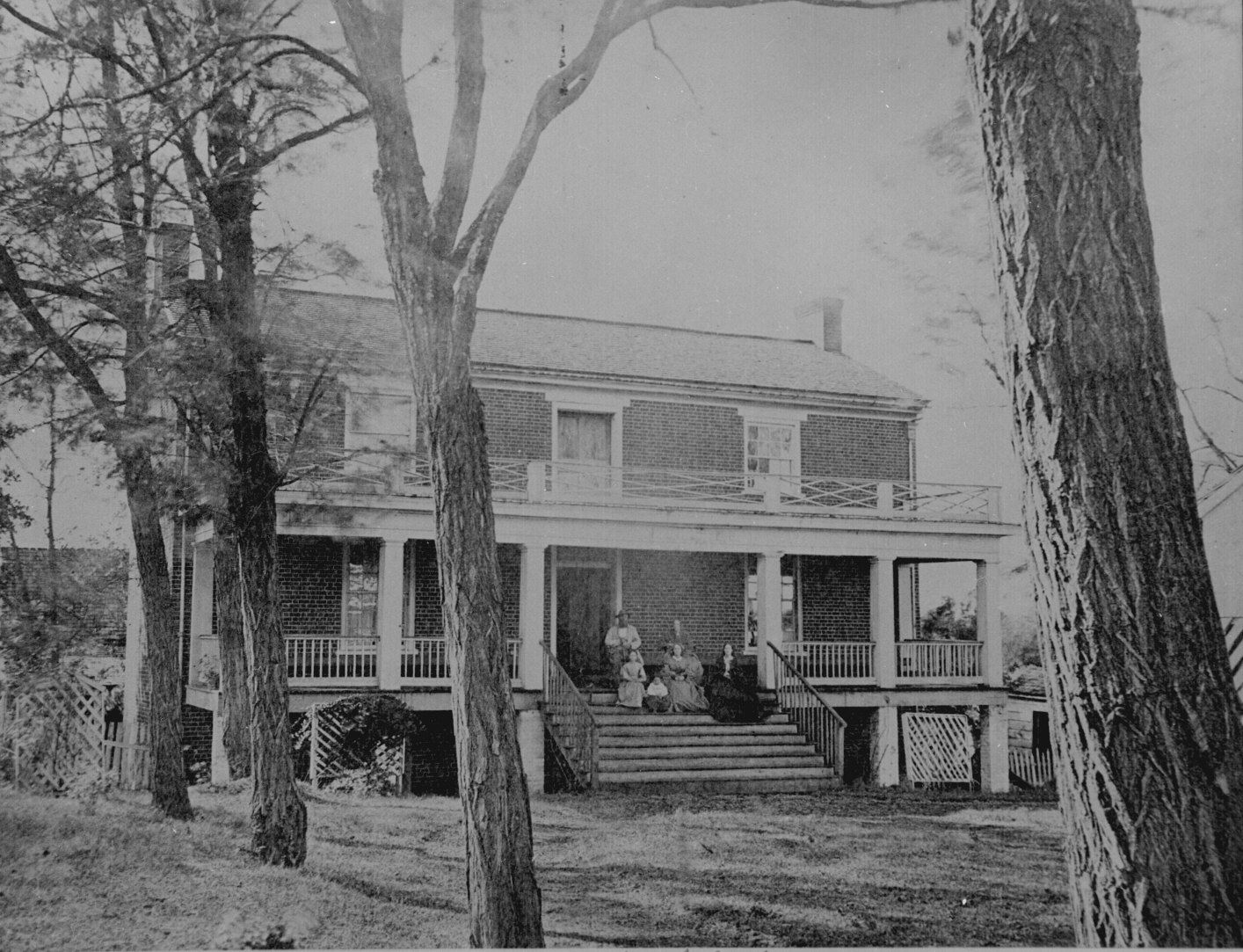 In his memoirs, Grant records what happened next:
In his memoirs, Grant records what happened next:
When news of the surrender first reached our lines our men commenced firing a salute of a hundred guns in honor of the victory. I at once sent word, however, to have it stopped. The Confederates were now our prisoners, and we did not want to exult over their downfall."Personal Memoirs of U.S. Grant,?Chapter LXVII
The Terms of Surrender
The terms of the surrender were very generous and allowed the Confederate soldiers, their officers having sworn that they would not take up arms again against the Union, to leave for home almost immediately. In his memoirs, Grant explains what he was thinking when he was drawing up the terms of surrender with General Lee:
I then said to [General Lee] that I thought this would be about the last battle of the war--I sincerely hoped so; and I said further I took it that most of the men in the ranks were small farmers. The whole country had been so raided by the two armies that it was doubtful whether they would be able to put in a crop to carry themselves and their families through the next winter without the aid of the horses they were riding. The United States did not want them and I would, therefore, instruct the officers I left behind to receive the paroles of his troops to let every man of the Confederate army who claimed to own a horse or mule to take the animal to his home. Lee remarked again that this would have a happy effect."
The Young Man Who Walked Home from Appomattox
My grandfather's grandfather, a Confederate private in Lee's army, was there in Appomattox when the war came to an end, and being in the infantry and so having no horse or mule, walked home from Appomattox. He lived to be a very old man, and when I was a small boy I loved to hear my grandfather tell us stories about the young man who walked home from Appomattox.
Did the Resurrection Really Happen?
Did the Resurrection actually happen? The Apostle Paul, writing in sometime in the 50's A.D., had this to say: "If Christ has not been raised, our preaching is useless and so is your faith" (1 Corinthians 15:14). In other words, Christianity rises and falls with the Resurrection of Jesus. But, the issue for many modern people is that though the Resurrection seems like a nice story, we know that dead people stay dead and that it couldn't possibly have happened. So, did the Resurrection happen, or not? I think it did, and here are three reasons why.
(By the Way: It Wasn't a Spiritual or Emotional Resurrection)
As a way around the difficulty of the Resurrection, some people say that what the Gospels report is some kind of spiritual or emotional sense that Jesus was still with his disciples after his death. This view does not at all match what the Gospels themselves say, namely that after the Resurrection:
- Jesus ate food (Luke 24:13-32 & John 21:1-14) and
- Jesus made physical contact with the disciples (Luke 24:36-43 and John 20:24-29).
The Gospels are very clear: the Resurrection was a bodily resurrection, and not a vague spiritual sense that Jesus was still alive.So, what reasons do we have to believe that the Resurrection happened?
Reason 1: The Women Witnesses
All the canonical Gospels agree that the first witnesses to the empty tomb and the Resurrection of Jesus were women. In our world, that detail doesn't surprise us, but in the ancient world this would have been a shocking detail because women weren't considered reliable witnesses in the ancient world.If you were making up a resurrection hoax in the 1st century Mediterranean world, you would never say that women were the first witnesses of your story. So, why do all the gospels insist that women were the first witnesses?The simplest reason for the inclusion of the women witnesses: because the Gospels are merely reporting what actually happened. The inconvenient truth of the women witnesses is a detail that argues for the plausibility of the Resurrection.
Reason 2: The Deaths of All Involved
Many people have died for lies that they believed were true, but groups of people do not die for what they know is a lie.Virtually all the disciples of Jesus were martyred for their faith in him. If they were making up the Resurrection, then they would have recanted their stories at the point of death. But they didn't. Chuck Colson, one of the Nixon men involved in the Watergate break-in, had this to say:
Chuck Colson, one of the Nixon men involved in the Watergate break-in, had this to say:
I know the resurrection is a fact, and Watergate proved it to me. How? Because 12 men testified they had seen Jesus raised from the dead, then they proclaimed that truth for 40 years, never once denying it. Every one was beaten, tortured, stoned and put in prison. They would not have endured that if it weren't true. Watergate embroiled 12 of the most powerful men in the world-and they couldn't keep a lie for three weeks. You're telling me 12 apostles could keep a lie for 40 years? Absolutely impossible.
Chuck Colson
The martyrdom of the early Christians is a strong argument in favor of the truth of their claims.
Reason 3: It Was Testimony, Not Legend
Modern people will say that the Resurrection is a legend, a folktale that took shape over generations and that consequently grew in the telling, like George Washington and the Cherry Tree.The problem with this theory is that it doesn't fit the facts: the letters of Paul began to be circulated around 20 years after the death of Jesus, the Gospel of Mark within 40 years, and the Gospels of Matthew, Luke, and John within 60 years (at the latest). In other words, Christians were publicly talking about the Resurrection within the lifetime of its witnesses. Anyone who wanted to investigate the truth of the Resurrection merely had to talk to its witnesses.A legend takes generations to develop, but the Gospels (and other New Testament materials) were written down and circulated within a generation or two of the events of that first Easter Sunday, i.e., way too soon a time for a legend to develop.Rather than being a legend, the Resurrection was testimony. Testimony is a valid form of historical memory. People who experienced the events say, "I was there. I saw it." January was the 70th anniversary of the liberation of Auschwitz, and there are thousands of people who lived through the Nazi concentration camps who can still testify today to their experience, 70 years later. One of the reasons Holocaust deniers have a hard time gaining a hearing is because there are people who can point to their blue tattoos and say, "No, it did happen: I was there."
Testimony is a valid form of historical memory. People who experienced the events say, "I was there. I saw it." January was the 70th anniversary of the liberation of Auschwitz, and there are thousands of people who lived through the Nazi concentration camps who can still testify today to their experience, 70 years later. One of the reasons Holocaust deniers have a hard time gaining a hearing is because there are people who can point to their blue tattoos and say, "No, it did happen: I was there." Just as the remaining Holocaust survivors' testimony is available to anyone wanting to investigate the Holocaust today, so the Resurrection witnesses' testimony was available to anyone wanting to investigate the Resurrection at the time that the New Testament was taking shape.
Just as the remaining Holocaust survivors' testimony is available to anyone wanting to investigate the Holocaust today, so the Resurrection witnesses' testimony was available to anyone wanting to investigate the Resurrection at the time that the New Testament was taking shape.
Conclusion: the Resurrection is Plausible
The Resurrection cannot be proved in a laboratory. But, we can examine the facts and decide that it is more plausible that the Resurrection happened than that it did not happen.Now, some people will accept the above and yet still insist: "We know that dead people stay dead, and therefore the Resurrection could not have happened." The problem with that position is that history is full of events that seemed impossible and that actually happened. I admit that the Resurrection is unique as an historical event, but that doesn't mean that it is necessarily impossible. In any historical inquiry, we have to look at the evidence and see where it takes us. In this case, I believe the evidence argues in favor of the Resurrection.The reason discussions like this are important are not because they can bring anyone across the threshold of faith (only God can do that), but because I've found that some people won't even approach the door of faith if they believe that the claims of the faith cannot possibly be true; arguments can't cause someone to believe, but they can knock down bad reasons for not believing.Here's hoping this little post might help someone somewhere come a bit closer.
A Movie I Won't Soon Forget
I recently saw a movie that will stay with me for a long time. It's about a place where deeply-entrenched poverty has nothing to do with race (at least, nothing to do with race the way Americans understand it), a place infected with a terrorism that has nothing to do with Islam, a place in which the soldiers sent from overseas to occupy and pacify it speak the same language and have the same skin color as the natives. And it's a place of ugly, brutal violence. That place is 1971 Northern Ireland during the Troubles.
"Where the Bodies Are Buried"
I stumbled across an essay in The New Yorker recently that vividly describes the terror and violence and complexities of The Troubles. In many ways, I probably don't fit the profile of a?New Yorker reader: I live in Texas, am a conservative Christian, and come at many issues from a very difference perspective than the secular, elite, bi-coastal consensus that?The New Yorker represents. Yet, I read?The New Yorker regularly, particularly the long form pieces, at which the magazine really excels.![Photos from the essay [newyorker.com]](http://static1.squarespace.com/static/5d70f59aefca59000162e4e6/5d7fcef39f682762992c8aca/5d7fcf039f682762992c8ca1/1568657155292/150316_r26257_rd-896.jpg?format=original) The essay, "Where the Bodies are Buried", is by Patrick Radden Keefe and is a fantastic piece of writing and journalism. It's about the Troubles (the period from the 1960s-1990s when Northern Ireland was a war zone), and about a particular nasty murder in 1972 of a 37 year-old widow and mother of ten children by the I.R.A. in Belfast. It's also about how Northern Ireland has made a fitful transition to peace, and about how Gerry Adams, leader of Sinn Fein, the I.R.A.'s political wing, has tried to cover up his I.R.A. past. It's a disturbing, evocative piece, and I highly recommend it. (Also worth mentioning is another essay on the Troubles called "Belfast Confetti," a New Yorker?essay from 1994 by current editor David Remnick, which is compelling in its own right and particularly?fascinating to read in 2015.)
The essay, "Where the Bodies are Buried", is by Patrick Radden Keefe and is a fantastic piece of writing and journalism. It's about the Troubles (the period from the 1960s-1990s when Northern Ireland was a war zone), and about a particular nasty murder in 1972 of a 37 year-old widow and mother of ten children by the I.R.A. in Belfast. It's also about how Northern Ireland has made a fitful transition to peace, and about how Gerry Adams, leader of Sinn Fein, the I.R.A.'s political wing, has tried to cover up his I.R.A. past. It's a disturbing, evocative piece, and I highly recommend it. (Also worth mentioning is another essay on the Troubles called "Belfast Confetti," a New Yorker?essay from 1994 by current editor David Remnick, which is compelling in its own right and particularly?fascinating to read in 2015.)
The Movie: '71
With?The New Yorker's essay in my mind, a week later I read about a new movie about the Troubles called '71, and a couple of friends and I went to see it. I don't think I'll ever forget it. '71?is about a young British soldier abandoned by his unit in a Catholic neighborhood in Belfast who is pursued through the night by I.R.A. killers. It's also about the fascinating (and terrifying) allegiances of 1970s Belfast, the amoral world of intelligence operatives, and what happens when an occupying force of young men is thrown into a complex political situation that all the foreign firepower in the world won't pacify. Through the long night, the young soldier comes in contact with the various factions of 1970s Belfast: the I.R.A. and its radical off-shoot the Provisional I.R.A., the Protestant loyalist militias, and the ordinary Roman Catholic and Protestants who try to live in the middle of a war.
'71?is about a young British soldier abandoned by his unit in a Catholic neighborhood in Belfast who is pursued through the night by I.R.A. killers. It's also about the fascinating (and terrifying) allegiances of 1970s Belfast, the amoral world of intelligence operatives, and what happens when an occupying force of young men is thrown into a complex political situation that all the foreign firepower in the world won't pacify. Through the long night, the young soldier comes in contact with the various factions of 1970s Belfast: the I.R.A. and its radical off-shoot the Provisional I.R.A., the Protestant loyalist militias, and the ordinary Roman Catholic and Protestants who try to live in the middle of a war. Walking down the stairs of the theater afterwards, I realized that I'd been keeping my entire body rigid and tense throughout the movie--it's that kind of film. It's really well done: terrifying, honest, brutal, and resists the urge to clean-up everything at it's end. Highly recommended, though not for the faint of heart.
Walking down the stairs of the theater afterwards, I realized that I'd been keeping my entire body rigid and tense throughout the movie--it's that kind of film. It's really well done: terrifying, honest, brutal, and resists the urge to clean-up everything at it's end. Highly recommended, though not for the faint of heart.
What The Experts Don't Want You to Know
Nobody knows the future. Nobody. That's the secret that the experts don't want you to know. Here are 3 examples of expert ignorance, and why that matters for you.
1. No One Knew the Future of American Oil
For most of my life, experts have talked about American dependence on Middle Eastern oil. And then, in the past several years, something extraordinary happened: America became the world's largest oil producer. In retrospect, it seems obvious how the shale revolution would cause us to extract oil that was previously too expensive or difficult to extract, but that's exactly the point: in retrospect, it's easy to see, but in the year 2000, I don't remember that any of our experts foresaw the American oil boom of the last several years. Why? Because no one knows the future. And then, this past year, oil prices collapsed. In Texas, where I live, lots of folks who work in the energy business are feeling that collapse, but I don't know anyone who predicted a year ago that oil prices would fall off a cliff. Why? Because no one knows the future.
And then, this past year, oil prices collapsed. In Texas, where I live, lots of folks who work in the energy business are feeling that collapse, but I don't know anyone who predicted a year ago that oil prices would fall off a cliff. Why? Because no one knows the future.
2. No One Got Ebola Right
Last fall when there a few cases of Ebola in Dallas, I remember reading the experts' predictions that the Ebola outbreak in Sierra Leone and Liberia might infect 1.4 million people by January 2015. Although about 10,000 people died and although the Ebola outbreak has been a disaster for the countries affected, the worst part of the experts' predictions did not happen (thank God!). Why? Because no one knows the future.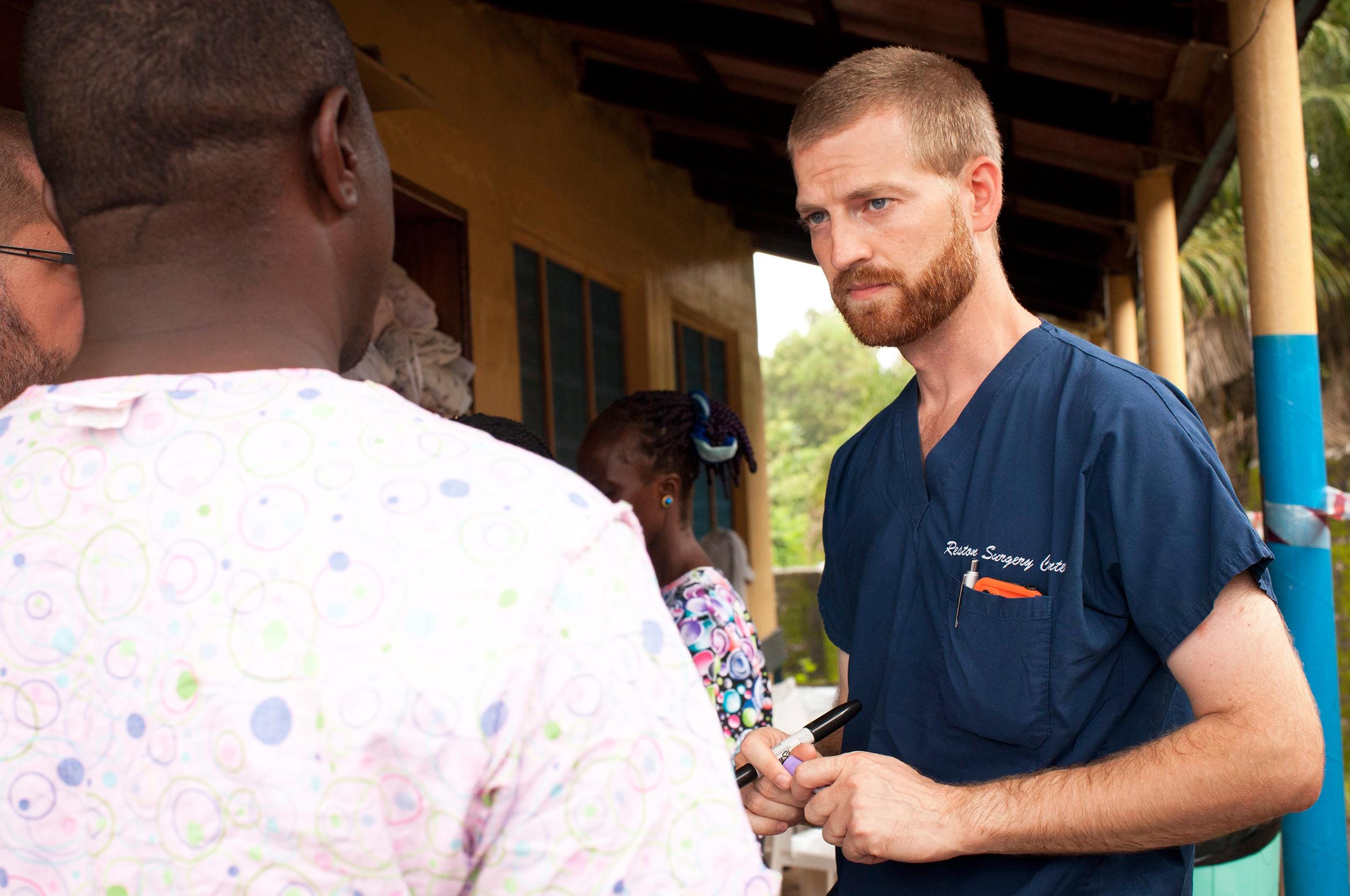
3. But That's Not Always Good: Look at the Cost of the Iraq War
I don't mean to suggest that the experts' predictions are always worse than what actually happens. Sometimes, reality turns out worse than the experts' sanguine predictions, as the depressing example of the the cost of the Iraq War shows.People argued in 2002-2003 about how much the Iraq War would cost, and people argue today about how much it ultimately cost, but what is absolutely certain is that it cost many many many times more than what the experts predicted in 2002-2003. Some things never change: no one thought the Civil War would be as long or as bloody as it was, either. War planners always underestimate a war's cost and casualties and length, except when they do the opposite.
Some things never change: no one thought the Civil War would be as long or as bloody as it was, either. War planners always underestimate a war's cost and casualties and length, except when they do the opposite.
The Experts Don't Know What Will Happen
Here's the point: no one knows the future, and no one knows on any particular issue whether the future will get better or get worse. Because no one knows the future, excessive worry about it is a waste of time.Often, when experts predict the worst, things will get better in unexpected ways: be hopeful.Often, when experts predict a rosy future, things will get worse in unexpected ways: be prudent.Either way, remember: no one knows the future, and there is no point in worrying about it: "Therefore, do not worry about tomorrow, for tomorrow will worry about itself. Each day has enough trouble of its own" (Matthew 6:34).
6 FAQs About Fasting
Fasting is not something that comes easily for me, and, judging by the questions I've been getting, it's not something that comes easily for many of you, dear readers. What follows are some Frequently Asked Questions on the topics of fasting and Lent.![[http://www.utahpeoplespost.com/wp-content/uploads/2014/06/10.jpeg]](http://static1.squarespace.com/static/5d70f59aefca59000162e4e6/5d7fcef39f682762992c8aca/5d7fcf029f682762992c8c67/1568657154225/10-2.jpeg?format=original)
Why Fast?
I remember asking my dad about fasting when I was a kid, and he told me he had asked my grandfather the same question when he was a kid. My grandfather had said, "Fasting is something Roman Catholics do during Lent, but we Protestants are supposed to give up things all year long." I loved my grandfather, but I think he was wrong to frown on fasting as some misguided practice that Roman Catholics do, and I'm glad that American Evangelical Protestantism has begun to embrace fasting and Lenten disciplines more widely.
- Fasting reminds us that there are people around the world for whom hunger is not a choice, and to a very small degree, fasting can help us stand in solidarity with them.
- Fasting reminds us of the temptations and privations of Jesus in the wilderness. Before there's the Resurrection, there's the Crucifixion. Before the crown, there's the cross.
- Fasting can help us set our minds?on what matters most.
- Fasting can help us pray with more focus and intensity.
I give a brief overview of Lent and fasting here:[embed]https://www.youtube.com/watch?v=wvPad5PEfjo[/embed]
What If I Can't Fast From Food?
Lots of folks have medical conditions that make it unsafe for them to fast from food during the day. Here's my advice, if you'd still like to fast: make your food as plain as possible, and eat just enough to keep healthy.
What Should I Do When I'm Fasting?
I use fasting as a way to help me pray: throughout the day, I'll pray something like "Lord, help me to desire you and your word as much as I desire food."Another technique is to use hunger as a reminder to pray for some particular topic. Maybe during Lent you can pray for the persecuted Church, or the situation in the Ukraine, or for your neighbor who struggles with faith, or for your marriage, etc. Every time you are hungry, pray for that specific situation or person.One other thing to do is to take on something life-giving while you are giving up something else. If you are fasting from food, take on prayer. If you are fasting from coffee, take on giving the money you would have spent towards a clean water project. (You can see suggestions of what to take on in the chart below.)
Does It Matter What I'm Fasting From?
Traditionally, fasting involves food, but you can fast from other things as well.
- You could fast from caffeine;
- You could fast from television;
- You could fast from complaining.
In the 40 Campaign we're doing at my church, each week during Lent involves a different kind fast. You can see the list below.
Should I Fast On Sundays?
Every Sunday is an Easter celebration, and so Sundays have traditionally been feast days. I like the thought of not fasting on Sundays for this reason.!["The Fight Between Carnival and Lent," by Pieter Bruegel the Elder [1559]](http://static1.squarespace.com/static/5d70f59aefca59000162e4e6/5d7fcef39f682762992c8aca/5d7fcf029f682762992c8c6a/1568657154437/carnival_and_lent.jpg?format=original)
What If I Give In and Break My Fast?
Try again tomorrow. Fasting isn't about showing off heroic self-denial; it's about learning to pray and focus on what matters most. How has the experience of fasting been for you?
40 Days of Dying to Yourself
How might you be different in 40 days of sacrifice and simplicity? Instead of excess, euphemism, and self-indulgence, I'd like to invite you to 40 days of sacrifice, simplicity, and self-denial. Join the 40 campaign. Take 2 minutes and watch the following video.[embed]https://www.youtube.com/watch?v=wvPad5PEfjo&feature=youtu.be[/embed]Today is Ash Wednesday, and it marks the beginning of Lent, the 40 days leading up to Easter (not including Sundays). During Lent, we remember the privations of Jesus during his time of temptation in the desert, and that before the Resurrection, there was the Crucifixion. Many Christians prepare for Easter by observing a period of fasting, repentance, moderation, and spiritual discipline during Lent.
Join Me in the 40 Campaign?
Starting today, my church is embarking on our 40 campaign: a Lenten campaign of sacrifice and simplicity. Each week we have a different thing to give up and a different thing to take on: How might you be different in 40 days of sacrifice and simplicity?
How might you be different in 40 days of sacrifice and simplicity?
Take the Abraham Quiz
The Bible is mysterious and difficult, but it's not impossible. With a little bit of background knowledge about the ancient cultures of the Bible, ordinary people like you and me can learn to read scripture in such a way that even some of its mysterious parts offer important insights. Below is a bit of background information about a very strange episode in Genesis. Read the background, take the quiz, and let me know what you think.!["Butcher's Shop," by Annibale Carracci, 1580 [Wikipedia]](http://static1.squarespace.com/static/5d70f59aefca59000162e4e6/5d7fcef39f682762992c8aca/5d7fcf019f682762992c8c60/1568657153717/Annibale_Carracci_-_The_Butchers_Shop_-_Google_Art_Project.jpg?format=original)
You "Cut" a Covenant
In the ancient middle east, the way 2 parties formalized an agreement was through a covenant ceremony. In Hebrew, you "cut" a covenant, because covenants involved taking animals and sacrificing them, and then walking between the carcasses.
And Say, "I'll Become a Slaughtered Calf"
Here's the point: when you walked between the pieces of the slaughtered animals, you were saying, "May I become like these dead animals if I don't keep my end of the agreement."(I think our wedding ceremonies would be much more interesting and divorce much less frequent if we adopted the same practice....)
So, Abraham Gets Ready
In Genesis 15, Abraham, on the Lord's instructions, prepares one of those covenants:
The Lord said to Abraham, Bring me a heifer three years old, a female goat three years old, a ram three years old, a turtle-dove, and a young pigeon.?10He brought him all these and cut them in two, laying each half over against the other; but he did not cut the birds in two.11And when birds of prey came down on the carcasses, Abram drove them away." [Genesis 15:9-11]
It's obvious what will happen next: Abraham will pass between the carcasses, showing his commitment to the Lord's plan.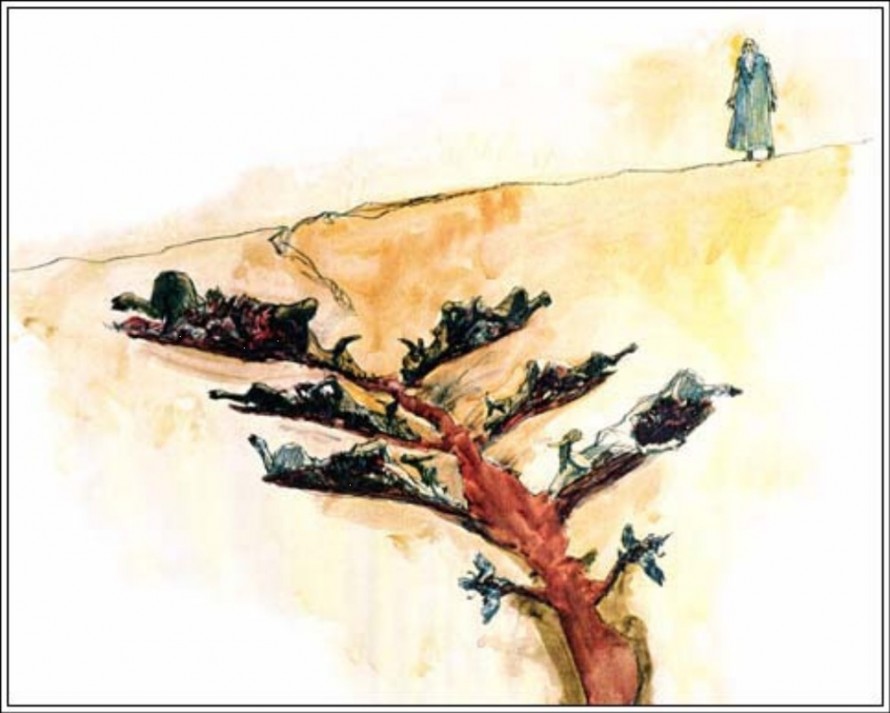
But Something Strange Happens
But, that's not what happens:
12?As the sun was going down, a deep sleep fell upon Abram, and a deep and terrifying darkness descended upon him....17When the sun had gone down and it was dark, a smoking fire-pot and a flaming torch passed between these pieces.18On that day the?Lordmade a covenant with Abram, saying, To your descendants I give this land, from the river of Egypt to the great river, the river Euphrates,?19the land of the Kenites, the Kenizzites, the Kadmonites,?20the Hittites, the Perizzites, the Rephaim,?21the Amorites, the Canaanites, the Girgashites, and the Jebusites." [Genesis 15:12, 17-21, my emphasis].
Take the Quiz: What Does Genesis 15:17 Mean?
What's the point of the covenant ceremony recounted in Genesis 15? What does this mean?(Hint: The best way to read the Bible is to read backwards, i.e., to read the Old Testament in light of what we have in the New Testament. To put it another way, use Jesus as the interpretive key. In light of what the Church believes about Jesus, what's going on in Genesis 15?)
P.S. Subscribe
If you‘ve read this far, you?re committed, so why not subscribe to future updates from my blog? Click?here‘to subscribe.














![Emmanuel AME Zion Church member Kevin Polite helps members into the church for the service on 6/21/15 [David Goldman/Getty Images].](http://static1.squarespace.com/static/5d70f59aefca59000162e4e6/5d7fcef39f682762992c8aca/5d7fcf069f682762992c8d08/1568657158071/150621123102-02-charleston-church-service-0621-super-169.jpg?format=original)

